Will there be a coup in Russia? - Putin is concerned

Russian President Vladimir Putin is wary of the possibility of a coup d'état amidst growing social discontent and economic difficulties in the country.
Modern.az reports that this was written by the British publication “The Telegraph”.
It is noted that the prolonged war with Ukraine, the deepening of Western sanctions, and economic stagnation have increased fears within the Kremlin leadership regarding internal stability.
The Russian economy is on the verge of a quarterly recession. The Central Bank's interest rate hikes have paralyzed businesses, inflation has risen by over 40% since the beginning of the war, and public debt has reached a record level.
According to the forecast of the Russian Ministry of Finance, the budget deficit in 2025 will be equivalent to 2.6 percent of GDP (approximately 5.7 trillion rubles), which is five times more than planned. To address the revenue shortfall, the government is forced to increase tax rates.
From 2026, it is planned to increase VAT to 22 percent and raise domestic borrowing, which will lead to a further increase in public debt.
Fuel prices have risen as a result of Ukraine's strikes on Russian oil refineries, while revenues from oil exports are decreasing.
According to Craig Kennedy, an expert at Harvard University's Davis Center for Russian and Eurasian Studies, the debt of military enterprises has already reached 190 billion dollars, which is equivalent to 37 percent of Russia's annual budget.
Analysts state that the Kremlin is becoming economically dependent on China. US President Donald Trump's imposition of new sanctions against “Rosneft” and “Lukoil” has further exacerbated the situation. Following this decision, China and India, the main buyers of Russian oil, have begun to reduce imports, which is a serious blow to the Kremlin's foreign exchange revenues.
“The Telegraph” writes that Putin's inner circle is conducting campaigns aimed at discrediting the opposition to alleviate internal pressures.
According to Angela Stent, honorary director of Georgetown University's Center for Eurasian Studies, this has “become a standard Kremlin tactic during periods of internal instability”.
The newspaper recalls that on October 14, the FSB opened a criminal case against former “YUKOS” head Mikhail Khodorkovsky and 22 members of the “Anti-War Committee” on charges of “attempting to seize power by force”. Khodorkovsky, who lives in London, called these allegations “completely false and aimed at creating fear”.
-
15:14,The US's military cargo transportation to the Middle East is increasing
-
14:59,New RULES for transgender athletes
-
14:40,15 criminals to Turkey were extradited
-
14:27,House explosion in Kabul - 8 people died
-
12:57,Wind will blow, there will be fog - TOMORROW'S WEATHER
-
12:37,Massive artificial intelligence infrastructure in the US: Amazon is building a billion-dollar data center
-
12:02,Iran is not seeking an atomic bomb - Abbas Araqchi
-
11:41,Russia attacked Zaporizhzhia with 300 drones - There are dead and wounded
-
10:56,The world's most hated LEADER
-
09:49,“France is taking steps contrary to the principles it declared to the world” - VIDEO
-
09:34,In Russia labor shortage - 11 million workers are needed
-
09:16,Mbappe 6 million euros from PSG demands
-
04:03,Donald Trump has changed the United States' arms sales rules
-
03:37,Hamas member neutralized in Gaza
-
02:01,Netanyahu goes to Washington
-
7 phrase_var_language.ay2 2026, 23:17Amusement ride accident in India: 1 fatality, 13 injured
-
7 phrase_var_language.ay2 2026, 21:32Together with Vens, he/she also to Azerbaijan COMES
-
7 phrase_var_language.ay2 2026, 21:06Attack message from the USA - Iran ANNOUNCED it is ready for dialogue
-
7 phrase_var_language.ay2 2026, 18:54“WarGonzo” correspondents banned from entering Armenia
-
7 phrase_var_language.ay2 2026, 18:33Ceasefire at the Winter Olympic Games?
-
7 phrase_var_language.ay2 2026, 17:53Where and when did Armenia last violate the ceasefire? - ANSWER
-
7 phrase_var_language.ay2 2026, 17:41Road accident in Afghanistan - 12 people died
-
7 phrase_var_language.ay2 2026, 17:13The individual who shot the general has been apprehended
-
7 phrase_var_language.ay2 2026, 16:20Student who shot their teacher WAS ARRESTED
-
7 phrase_var_language.ay2 2026, 16:05The shot teacher to the ward was transferred
-
7 phrase_var_language.ay2 2026, 15:34Azerbaijan always stands by Pakistan
-
7 phrase_var_language.ay2 2026, 15:26The crime of intentional murder in Shamkir was solved - Joint statement
-
7 phrase_var_language.ay2 2026, 15:07Student who shot teacher may be imprisoned for up to 9 years
-
7 phrase_var_language.ay2 2026, 15:00Women wanted for human trafficking's LIST
-
7 phrase_var_language.ay2 2026, 14:52Criminal news normalizes violence - PROTEST



























































